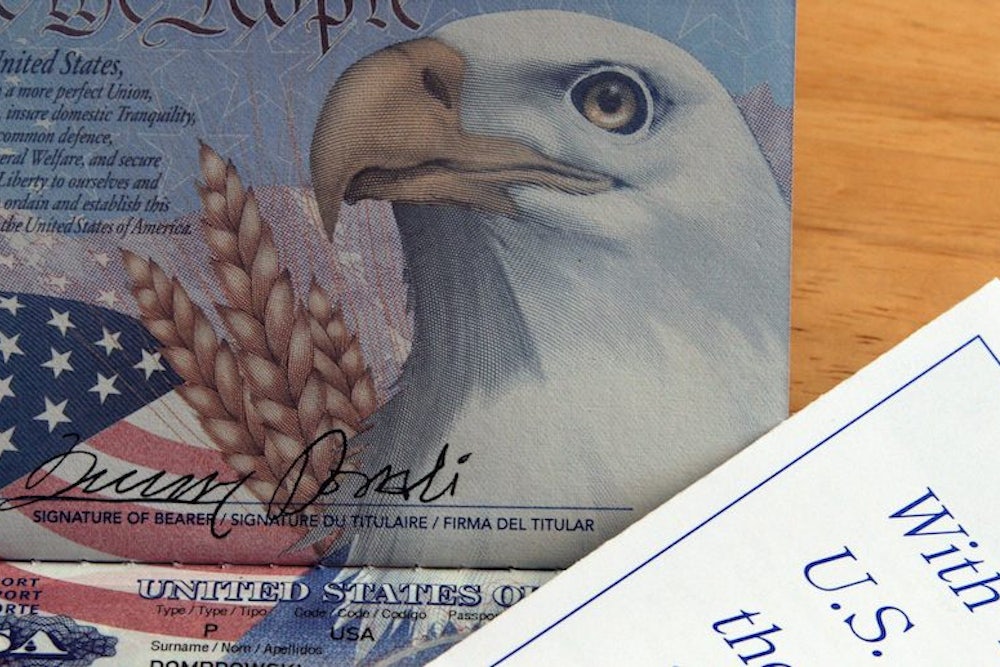Menachem Zivotofsky was born in October 2002 to Americans parents living in Israel. That same year, Congress passed the Foreign Relations Authorization Act, which required the U.S. government to put "Jerusalem, Israel" as the place of birth in the passports of Jerusalem-born U.S. citizens, if they requested it. But the State Department refused to enforce the law, in keeping with the government’s longstanding neutrality on Jerusalem—that it’s neither part of Israel nor Palestine.
Over a decade later, the attempt by the Zivotofsky family to get “Jerusalem, Israel” as his birthplace on his passport, as opposed to simply "Jerusalem," is making its way to the Supreme Court. On Monday, the Supreme Court said that it would hear the case of Zivotofsky v. Kerry, and answer the question of whether the State Department has to enforce the statute and list "Jerusalem, Israel" in Menachem Zivotofsky's passport.
As the case has wound its way through the courts, including an earlier decision at the Supreme Court allowing the case to move forward, it has become a cause celebre amongst right-wing lawyers and some Jewish organizations. Nathan Lewin, an attorney known for representing Jewish causes, took up the case. In one brief, major Jewish organizations including the Anti-Defamation League, B’nai Brith, and AIPAC argued for Zivotofsky's position. Conservative legal luminary Ted Olson represented a group of congressmen who filed a brief in the case. In the lead-up to the 2012 election, right-wing commentators tried to use the case to argue that the State Department’s refusal to recognize Jerusalem on the passport represented President Obama’s anti-Israel attitude. Now that the case will go before the Supreme Court, we can expect more such haranguing.
However, this case has nothing to do with the actual capital of Israel and everything to do with the constitutional power of the president. Jewish organizations, even those who feel passionately that Jerusalem should be the undivided capital of Israel, ought to steer clear of the case. Even Lewin, Zivotofsky's lawyer, conceded that “this case is much more limited in a Jewish context” and “much broader in the separation of powers context.”
The problem is that, on separation-of-powers grounds, Zivotofsky's case is largely without merit. The Constitution gives the president the right to receive ambassadors, and this has broadly been interpreted to include a "recognition power" that allows for the president to speak as the sole representative of the United States in matters of international diplomacy. Judge Karen Henderson of the D.C. Circuit ruled that the law requiring “Israel” to be inserted in the passport was unconstitutional because the law “impermissibly intrudes on the President’s exclusive authority under the United States Constitution to decide whether and on what terms to recognize foreign nations.” While the question of a passport is not itself in the Constitution, the State Department noted in a brief that Jerusalem’s status is “highly sensitive” and the executive branch had carefully maintained neutrality on the position of the city since 1948. That is why even President George W. Bush, when he signed the Foreign Relations Authorization Act in 2002, issued a signing statement making clear that he did not think the provision regarding passports was constitutional.
Whatever one thinks of the peace process, it ultimately is the constitutional job of the president to decide when and how to recognize foreign powers, and it is not a job that Congress should get into with one-off pieces of legislation. The issue is certainly not a partisan one. Even George Shultz, secretary of state under President Ronald Reagan, objected in 1984 to a bill that would require the embassy to be moved from Tel Aviv to Jerusalem on the grounds that the bill was “so closely connected with the President’s exclusive constitutional power and responsibility to recognize, and to conduct ongoing relations with, foreign governments as to, in our view, be beyond the proper scope of legislative action.” Presidents of both parties have chosen to maintain neutrality over the status of Jerusalem, and whatever one thinks of that policy, they have the constitutional right to do so.
When Zivotofsky v. Kerry goes back to the Supreme Court, we undoubtedly will hear more from right-wing commentators about the anti-Israel leanings of the Obama administration or claims about then-Secretary of State Hillary Clinton’s role when the case was Zivotofsky v. Clinton, but these are red herrings. This case is about the Constitution’s allocation of powers, not about Israel. And so far, the Obama administration has been on the right side of the law in this case.
